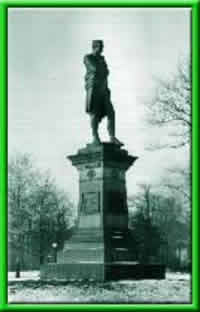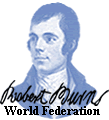|
 With
appropriate ceremonies and with a more than appropriate "Scotch mist"
hanging over the scene, the monument to Robert Burns was unveiled in the
Horticultural Gardens, near the corner of Carlton and Sherbourne Streets,
yesterday afternoon. With
appropriate ceremonies and with a more than appropriate "Scotch mist"
hanging over the scene, the monument to Robert Burns was unveiled in the
Horticultural Gardens, near the corner of Carlton and Sherbourne Streets,
yesterday afternoon.
The arrangements of the committee was very complete, and the weather,
though threatening, and at times inconvenient, did not damp the ardor
of the devotees of Scotland's lyric king. A space at the northeast corner
of the park had been roped off, to which ticket-holders were admitted
through a temporary gate on Sherbourne Street. A large platform had been
erected near the shrouded monument for the speakers and guests, in front
of which were the chairs for the audience. A little before the time set
for the opening, the skirl of the pipes announced the arrival of the city
and suburban camps of the Sons of Scotland 110 strong, headed by the grand
officers of the society. At 3.30 Mr. David Walker, the president of the
Monument Committee, who has done more than anyone else to secure the erection
of the monument, opened the meeting with a few congratulatory remarks.
It gave him great pleasure to see such a gathering in spite of the weather,
and on behalf of the gathering he thanked all those who had given so liberally
to enable them to see the completion of this work. It was a proud day
for himself and for all connected with the effort.
Mr. James L. Morrison introduced Mrs. Walker in a few fitting words, and
noted that the granite pedestal and bronze panels were the work of a Canadian
firm, the McIntosh Marble and Granite Company of North Toronto, the designs
for them being drawn by Mr. E. Hahn, a very young man, and a graduate
of the Toronto School of Art. Two of the panels were in place, those illustrating
Tam O Shanter's flight and "John Anderson, My Jo." Two others
"The Cotter's Saturday Night" and "The Mountain Daisy,"
would be put in place in a few days.
Mrs. Walker, who had been presented with a bouquet of red roses by Miss
Caroline Morrison, came forward and drew the cord which caused the drapery
to fall to the ground and disclose the handsome statue. This was the signal
for three cheers, after which the male chorus of the 48th Highlanders
Band san one of Burns' most characteristic songs: "A Country Lad
Was Born in Kyle."
Mr. Walker explained that Mr. D.W. Stevenson, the artist, had intended
being present, but was prevented by the orders of his physician. Had he
been there he could have told at what stage of Burns' life he conceived
the portrait to be taken. For himself, he fancied it represented the poet
while he was at Ellisland, before he became an excise officer, more matured
than in the days at Mossgiel.
Prof. Clark's Address.
The brought on the orator of the day, Rev. Prof. Wm. Clark, of Trinity
College. He spoke of the honor conferred upon him in this selection, and
congratulated Mr. Walker, to whom, more than to anyone else, they were
indebted for this statue, upon seeing the termination of the work. This
was an anniversary, on this day 106 years ago, July 21, 1796, there was
taken from the world one of its keenest and brightest intellects, and
one of the warmest and noblest hearts that ever beat under haden grey
or tartan plaid. They were not so much doing honor to Burns as honor to
themselves in setting up this memorial to him in this great city. He was
addressing them without any apology. It did not require any. (Applause.)
Burns was essentially a great and good man. Burns had his faults - who
had not - but he set before himself a high ideal, and it was his grief
that he fell short of it. They honored what was good and great in him,
and that was essentially the man. To those who held up their hands at
Burns he replied that he preferred the author of "Holy Willie's Prayer"
to Holy Willie himself - (hear, hear) - and in this they had with them
the verdict of humanity. He hoped they would not claim Burns merely as
a Scotchman, for much as he loved Scotland he loved humanity more.
As Talleyrand said, "There is somebody wiser than anybody, and that
is everybody," and when they had the verdict of humanity on their
side what need they care about an exceptional opinion on the other side.
Professor Clark pointed out that this verdict had been instantaneous,
had never been reversed. When the first Kilmarnock edition was issued
he was recognized by those capable of judging as one of the leaders of
literature. In this respect he surpassed every other poet. Witness the
struggles of Tennyson before he was recognized. The only one who could
be compared to him in instant appreciation was Spencer, and he was not
a poet of the people. And some once deemed great poets had been completely
forgotten, as for instance, Cowley. Who in that audience had read ten
pages of Cowley? As showing how fully Burns was appreciated, Prof. Clark
quoted Cowper, who held Burns was so great that he needed no apology for
his language or for what might be considered his defective education.
And that appreciation had gone on growing, not only in Scotland, but wherever
the English language was spoken. Even if the dialect should be forgotten,
people would study it to be able to read Burns. And this was not to be
wondered when they recalled his nobleness, tenderness, and the warmth
of his heart.
The Song was the
Man.
It was absurd to talk of Burns and his poetry as two separate things,
because the poetry was always the expression of the man. He never posed,
was never self-conscious, but always gave expression to what rose in his
heart. There was no more sincere, less artificial writer in the whole
range of British literature than Burns. If they wanted to see the difference
let them go back to Alexander Pope, where they would see the perfection
of artifice as in Burns they saw the perfection of nature.
The orator recalled, when lifted up by prosperity among the noble and
the great at Edinburgh, how well he carried himself, earning the praise
of Scott and of the Duchess of Gordon. On that occasion the greatest felt
that he was their equal, and it was probably the only time in his life
that Burns was among equals.
Two forces dominated Burns in his poetry. The first he gives in his "Epistle
to the Guide Wife of Wachope" [sic] -
E'en then a
wish , I mind its power -
A wish that to my latest hour
Shall strongly heave my breast -
That I for poor auld Scotland's sake
Some useful plan or beuk could make
Or sing a sang at least.
The rough burr-thrissle, spreading wide,
Among the bearded bere.
I turned the greeder-clips aside,
And spared the symbol dear.
There was another
reason besides patriotism which animated Burns. As the French say, he
had the defects of his qualities. We bear with his defects, because he
had such qualities. We bear with his faults better than we can those of
the censors, who are often not fit to black his boots, because we remember
what the man was. His second great influence - he would not hesitate to
say it was his love for women. In patriotic strains no man had uttered
more glorious words than Burns. Some had said his "Scots, Wha' Hae"
was the noblest war song in all literature. But the glory of Burns was
his songs, and the glory of his songs, love songs. If anyone didn't like
them, they need not read them, but he was inclined to think that those
who professed not to like them, read them in secret. (Laughter.) The most
delicate compliment ever paid to woman was contained in the last verse
of "Green Grow the Rushes."
Green grow the
rushes, O,
Green grow the rushes, O,
The sweetest hours that ere I spend
Are spent among the lasses, O,
Auld Nature swears, the lovely dears,
Her noblest work she classes, O;
Her 'prentice hand she tried on man
And then she made the lasses, O.
The song, "My
Nannie, O," was as near perfection as anything could come.
As Burns excelled in love songs so also in songs of friendship. Wherever
men met "Auld Lang Syne" not only joined their hands but oftentimes
hearts that had been estranged.
It had been claimed that Burns was a singer and nothing more, but he maintained
that he was a great teacher. He thought it would help every clergyman
if he would meditate upon the presentation of hell in "The Epistle
to a Young Friend" before going into the pulpit. Not that he wanted
to deny the orthodox conception of hell, but he felt sure it was not the
best way to frighten people into goodness by fears of hell. Look how Burns
appealed to the sense of human dignity in this epistle: -
To catch Dame
Fortune's golden smile,
Assiduous wait upon her;
And gather gear by every wile
That's justified by honor;
Not for to hide it in a hedge,
Or for a train attendant
But for the glorious privilege
Of being independent.
The fear o' hell's a hangman's whip
To haud the wretch in order;
But where you feel your honor grip,
Let that aye be your border.
Lastly, in "A
Man's a Man for a' that," Burns opened up a glorious prophecy: -
Then let us
pray that come it may -
As come it will for a' that -
That sense and worth, o'er all the earth
May bear the gree, and a' that.
For a' that, and a' that,
It's coming yet, for a' that
That man to man, the world o'er
Shall brothers be, for a' that.
 "I
think," said Prof. Clark, in conclusion, "Burns does not owe
us much whatever we may do for him. Alas, it is little we can do for him
now, and those who could did nothing. As Carlyle says: 'Nature gave them
this nobleman and they had nothing better for him to do than gauge beer
barrels.' We can follow him with love, our gratitude, and our tears."
(Loud applause.) "I
think," said Prof. Clark, in conclusion, "Burns does not owe
us much whatever we may do for him. Alas, it is little we can do for him
now, and those who could did nothing. As Carlyle says: 'Nature gave them
this nobleman and they had nothing better for him to do than gauge beer
barrels.' We can follow him with love, our gratitude, and our tears."
(Loud applause.)
Mr. Wm. Campbell, secretary, read a letter from Lord Dundonald, regretting
his inability to be present; and also exhibited a snuffbox presented by
Burns to an old friend, and now the property of St. Andrew's Society,
Dundas.
The Male Chorus sang, "Ye Banks and Braes of Bonnie Doon," and
Dr. Kennedy moved a vote of thanks to the orator of the day, which was
responded to by three hearty cheers. The audience then sang "Auld
Lang Syne." Cheers were given for Mr. and Mrs. Walker, and the gathering
broke up with the National Anthem.
Among those present were: - Dr. Kennedy, ex-president, St. Andrew's Society;
David Boyle, J. McP. Ross, Joseph Tait, John Douglass, Mr. And Mrs. Matthew
McKean, Chicago; Wm. Adamson, Douglas Scott, president of the Caledonian
Society; Wm. Simpson, president of the Burns Literary Society, N.L. Steiner,
Col. Stevenson, Montreal; A. Fraser, G.C. Sons of Scotland, Major D.M.
Robertson, J.B. Dow, John Burns, D. Mackay, Whitby; Dr. John Ferguson,
Wm. Banks, president, Caithness Society; H.M. Mowat, K.C.; D.B. Logan,
Capt. Ross, Capt. Wm. Hendrie, Hamilton; Dr. Forbes, Duluth; J.C. McMillan,
Gaelic Soc.; D.R. Wilkie, E.B. Osler, M.P., Dr. James Burin, T.C. Irving,
Geo. W. Grant, E.S. Cox, James Massie, R.B. Reid, Robt. Jaffray, Rev.
Dr. Dewart, Rev. Armstrong Black, John Bertram, Dundas, T.M. Bain, Mrs.
Woodburn, Kilmarnock, Scotland, and James Gunn.
Article contributed by Jean Paton.
|
|











